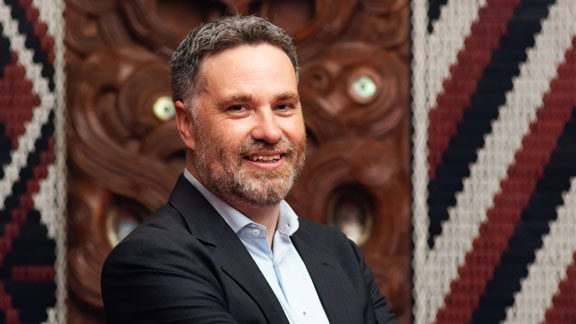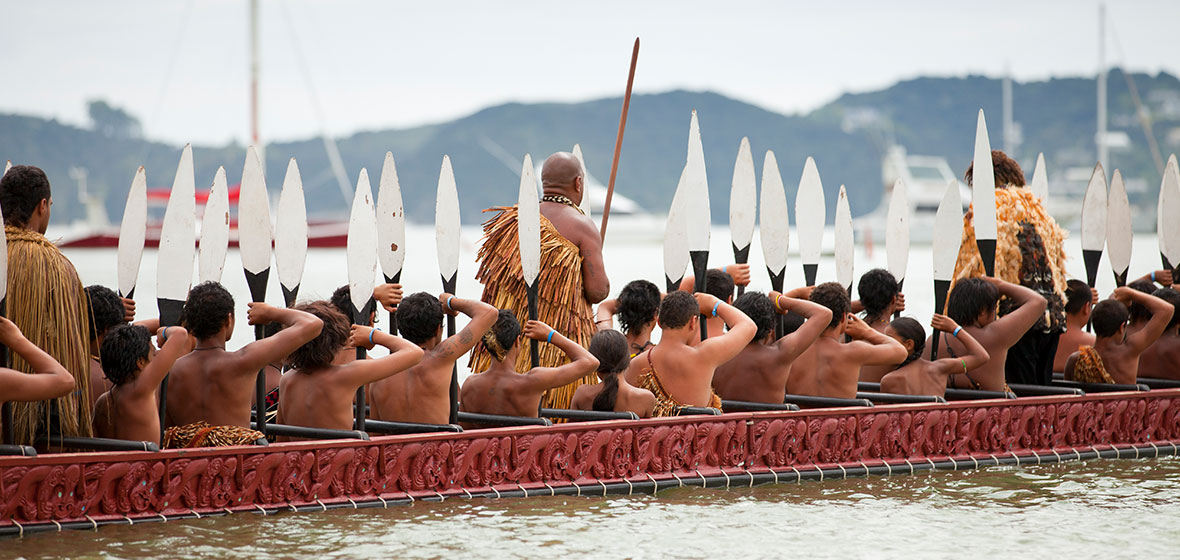On 20 January, Māori leaders and their families collected at Tūrangawaewae – the seat of the Māori King - in a show of 10,000 attendees showing unity in the face of New Zealand government policies that reverse decades of incremental progress in Māori legislative recognition and rights.
At least 12 policies and long-awaited initiatives that provide for culturally sensitive health care and the use of the Māori language in the public service are either under review or being repealed by the coalition government (National’s Christopher Luxon, New Zealand First’s Winston Peters, and Act party libertarian David Seymour).
The New Zealand government has also flagged a potential review of the Treaty of Waitangi (Te Tiriti o Waitangi), an agreement made in 1840 between Māori and the Crown. While the treaty is not a legal agreement, its principles are fundamental to existing government legislation.
Closer to home, since the majority of Australians voted no in the Voice referendum, the reversal of gains by Indigenous Australians and Māori have parallels that ought to concern anyone who believes in human rights and the recognition of cultural identity.
A change in government signalled the reversal of Māori cultural recognition
At the end of December 2023, Kiingi Tuheitia Pootatau Te Wherowhero VII issued a royal proclamation asking tribes to unify (a national hui) in challenging the coalition government’s dismissal of hard-won rights and recognition on 20 January 2024 at Turangawaewae Marae, near Hamilton. It was timely since a draft memo outlining the coalition’s proposed changes was leaked from the Ministry of Justice on 19 January.
Not only does the coalition government have plans to review the place of the Treaty of Waitangi within NZ’s laws, but there have also been edicts issued to ensure the Māori language – te reo – is limited, or removed, from use within the public sector, which includes ordering public bodies to use English titles rather than Māori. Concerningly for many Māori, the government has also pledged to dissemble the Māori Health Authority, which was set up by the previous Labour government to create greater health equity between Māori and non-Māori.
Not unlike Australia’s First Nations desire to see treaty enshrined, the Kiingi said he wanted the Treaty to be entrenched in constitutional law to prevent further risks and reversals in Māori rights.
Years of progress are being rolled back
In September 2022, a Māori tribe succeeded in getting a landmark apology and millions of dollars (NZ$177 million) in compensation for colonial atrocities, including mass killings of Māori and theft of their land. It resulted from New Zealand’s Treaty of Waitangi provisions enabling indigenous people to seek compensation for colonial attacks. Over 100 deeds of settlement have been signed and more than 73 passed into law.
LSJ spoke to Wellington-based Carwyn Jones, who is the Head Lecturer for Māori Laws and Philosophy at the Māori university, Te Wānanga o Raukawa. He previously worked at the Waitangi Tribunal and the Māori Land Court, including the Office of Treaty Settlements. He was one of the negotiators for Te Rohe o Te Wairoa Treaty of Waitangi Claim, an agreement between the Crown and a Māori claimant group to settle that claimant group’s historical claims against the Crown that was signed in 2016 and took effect in 2018. He is of Ngāti Kahungunu and Te Aitanga-a-Māhaki descent.
Jones says that the coalition government’s election in October 2023 (it was sworn in on 27 November) was concerning, but the present proposals are beyond the worst predictions he had.
The negative consequences for Māori were “clear to me”, he says. “But perhaps not the extent to which the government would roll back some of the mechanisms or policies in relation to Māori rights. So, we have a coalition of three parties: the National Party, New Zealand First, and the Act Party. While the National Party is the main Conservative Party, it was the Libertarian Act party that had been running a very aggressive anti-Māori campaign, including this proposal to have a referendum on redefining the principles of the Treaty of Waitangi.”
Initially, the referendum seemed an unlikely proposition being championed by “a fringe party” since the National Party viewed it as too divisive.
Jones says, “However, what we saw coming out of the coalition negotiations was that the three parties agreed to support the introduction of legislation to set up a referendum, at least through its first stage to a select committee. So, there’s no commitment beyond that, but [further action] certainly hasn’t been completely ruled out.”
Proposed rollbacks are powerful in their symbolic rejection of culture
Jones says that some of the government’s proposals may seem less consequential than others, but they are powerful in the symbolic act of removing a right.
“There have been steps to question the payments that public servants get is recognition for the ability to use and speak te reo Māori which have been in place for a long time. The government’s looking to remove this to ensure that government agencies use the English names first and not prioritise Māori names. So, in some sense, these are small things, but they’re really quite symbolic, and I think they’re deliberately intended to send the message both to Māori to the supporters of the [coalition] government parties that ‘we’re not going to support Māori’.”
More than a dozen state agencies, or two-thirds of all agencies, pay te reo allowances from $500 to a maximum of $3500 a year for their staff to learn the language, a rate that had not changed since 2003 until a recent inflation rise.
The Māori Language Commission Te Taura Whiri told Radio New Zealand it would be “a great shame” to end the allowances that had remained without controversy under governments since the 1980s.

An unwritten constitution makes the Treaty of Waitangi principles vital to Māori
Jones says, “We’re one of the few remaining countries in the world without a formal written constitution, so a lot of things that make up the constitution, including the Treaty of Waitangi, don’t have much in the way of formal protections. The Treaty is not unusual in terms of the New Zealand constitution in that respect. That’s why the term ‘the principles of the Treaty’ is so important because that’s become the legal mechanism which has been used to bring the principles of the Treaty into legislation.”
Jones explains that in the late 1980s, when New Zealand was developing its Bill of Rights Act, there was discussion of whether the Treaty of Waitangi should form part of that.
The Bill of Rights is an ordinary statute without constitutional protection.
He says, “Many Māori didn’t want Treaty in legislation because that would mean parliament could amend the treaty, the legislation, in a way. There was a feeling that it ought to remain outside the legislative framework, but there’s always been the sense that the Treaty is a constitutional document that that is layered over the top of other kind of legislation.”
Jacinda Ardern’s government progressed Māori equality
Jones says, “Ardern’s government certainly took some steps towards better recognition of Māori rights. One thing that was important, and we’re still yet to see the potential of, is the creation of Te Arawhiti, the Māori Crown Relations agency.”
The agency, announced in September 2018, consolidated a number of offices into one agency, including the Crown-Māori Relations Unit, the Office of Treaty Settlements (which negotiates treaty settlements on behalf of the Government), the Marine and Coastal Area (Takutai Moana) Team, and the settlement commitments unit.
“That was important in shifting the focus away from thinking about the Treaty in terms of redressing breaches, but to expand thinking about the Treaty in terms of the relationship between Māori and the crown across broader areas,” says Jones.
Jones says that Ardern’s government had started implementing the UN Declaration on the Rights of Indigenous Peoples (UNDRIP), but in December – despite protestations – Cabinet agreed that the government would cease work on a plan to implement UNDRIP, which recognises the rights of indigenous people across a number of areas, including the right to self-determination.
New Zealand, or Aotearoa, endorsed the Declaration over 10 years ago and, according to Amnesty International, has an obligation to realise UNDRIP.
“[The coalition government] stepped back from it partly in response to opposition,” explains Jones. “There was fear-mongering about the recognition of Māori rights. There was also a significant piece of legislation around water infrastructure, which is largely managed at a local government level.”
He is referring to the Three Waters legislation, under which The Water Services Entities Amendment Act introduced in April 2023 amends the Water Services Entities Act 2022. The coalition government has since repealed this.
Jones says, “The legislation was intended to provide for regional water bodies, which would have a co-governance element. Those infrastructure bodies would be 50-50 Māori representation at a local government level. And again, that was something that proved really unpopular for Ardern’s government, and to their credit, they didn’t step back from the co-governance aspect of it, but they did step back from some parts of what they had proposed.”
“There was fear-mongering about the recognition of Māori rights. There was also a significant piece of legislation around water infrastructure, which is largely managed at a local government level.”
Māori are united in concerns about coalition proposals
Jones says, “Last weekend [20 January], I was at the big gathering that the Māori king had called to talk about responses to the government’s program. They were expecting 3000 people, but in the end, 10,000 turned up to that. It demonstrated unity across Māori about rejecting the government’s proposals. Māori are in different circumstances and, resulting from the Treaty settlements, some have assets resulting from settling historical claims from 20 years ago, while many mountain communities don’t have those resources, and others are quite impoverished. There’s variation around exactly what needs to happen, but there’s uniformity across rejecting the government’s proposal and exercising and asserting our own authority.”
End of the Māori Health Authority and an urgent repeals process are concerning
Jones says, “The government is disestablishing the independent Māori Health Authority, which had been established under the last government following a recommendation from the Waitangi Tribunal that it was necessary to deliver equity in the health system.”
This, along with other repeals, has begun taking place.
“We’ve already had a number of pieces of legislation passed under urgency, which have repealed things that the former government has done. The referendum on the Treaty principles legislation also appears to be going ahead as soon as possible. We have a three-year parliamentary term here, so all of these things are planned to happen quite quickly.”
Jones says the coalition government is also seeking a referendum to amend the constitution to extend the parliamentary term to four years but “generally, the electorate prefer to keep politicians on a short leash.”
A breach of human rights is taking place
“I think there are certainly clear breaches of human rights,” Jones tells LSJ. “Particularly because this will disproportionately affect Māori. The cessation of work around the UN Declaration on the Rights of Indigenous Peoples and [the dismantling of the] Māori Health Authority have taken place despite the government not revealing what it’s going to replace that with. Right now, we have equity in the health system that the government is going to remove, so that’s discriminatory.”
He adds, “There are a number of matters relating to non-compliance with the principles of the Treaty and the Waitangi Tribunal’s jurisdiction that also breach human rights. Removing those legal mechanisms to recognise Māori rights will be addressed in communication with UN bodies and with the Committee on the Elimination of Racial Discrimination. We’re also seeing claims being lodged and court proceedings being started in the Waitangi Tribunal, and we’re likely to see more direct action protests.”




